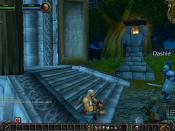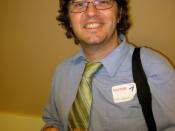Within this paper, the author explores the use and adaptation of a language specifically developed for and by a community of people who play computer games, using World of Warcraft as the specific research site. Leet speak or !337 $p34k, the language used in some degree by almost every member of this online community, incorporates symbols and numbers to convey language, and commonly includes acronyms which while by themselves do not compose this genre, do contribute to its description. Initially used by hackers (those who illegally compromised software) and termed as an 'elite' language (shortened to 'leet'), it is most commonly used on World of Warcraft to highlight those who are "seeking entrance and acceptance into the game world, generally 12-16 year olds" (Blashki, 77). However, despite this general opinion, the majority of North American gamers - over two million according to Blizzard Entertainment, the creators of World of Warcraft - still use this lexicon to communicate online.
However, what is the purpose of this bastardization of the English language, and what is it meant to convey?While online communication has been the focus of research for over a decade, online gaming communication has emerged only recently. As Kurt Squire suggests, 'despite the maturing medium, the ⦠social context of gaming has been woefully unexamined' (Squire, p. 2). Squire further suggests that the study of game playing communities requires further 'qualitative' explorations to uncover complex social structures that exist.
To begin, one needs to have some familiarity with what World of Warcraft is. Defined as a massive multi-player online roleplaying game (MMORPG), it is a "rich, persistent alterative world, a medieval Matrix with lush graphics and even a seductive soundtrack." (Levy), where players first must create an avatar from one of ten races split between two factions: Alliance (draenei - blue demons, night elves, humans, dwarves and gnomes) or Horde (tauren - upright oxen, orcs, undead, blood elves and trolls). Clearly, the alliance are generally the natural human-esque good guys, while the horde are generally perceived as the disfigured and/or mutated bad guys. Once the decision is made as to what race a person would like to play, the next decision is what class: paladin, priest, warlock, mage, shaman, druid, warrior, hunter or rogue. This then is the image that the player sees and that other players see. Once these decisions have been made, the player enters the game, and is instantly within the realm of the community. 'Channels' immediately are joined, and the general chat channel begins to cycle as people talk, discussing both their lives outside the game as well as aspects of the game. However, while this is similar to being at a party and just listening at the outskirts, one truly joins the community upon joining a guild. As Levy points out in his article, "Living a Virtual Life" (Newsweek, Sept. 18, 2006) -"Generally, though, players of the game enjoy a form of com-ity rarely seen in the real world; higher-level players go out of their way to tutor newbies and accompany them on quests. Deep friendships are forged. Relationships begin that flower into marriage, with Tauren brides and Undead grooms tying the knot in some virtual tavern in Thunder Bluff."The point, then, is that within the game there exists a society of players, assisting each other, and forming real-life relationships with each other inside the game. People no longer need to meet face to face to be friends, but rather, have something in common via the game itself and thereby create a society within the game. These people often group up together, forming 'guilds' of extended relationships, of friends, friends of friends and even a distant relative or two.
However, the question is, how do these people communicate, and for more information on communication online, this author chose to access one of Microsoft's articles, titled "A Parent's Primer to Computer Slang," published in January, 2007. Within this article, leet speak is defined as "digital slang," and is defined by four points: that numbers and symbols replace letters that are similar - i.e. 3 for E, and $ for S, that letters can be substituted for other letters that sound alike - skills therefore can be replaced by skillz, that mistakes are left uncorrected - the becomes teh, and that 0rz can be appended to pluralize or emphasize, such as skillz0rz. While by no means a full set of rules, the Microsoft article begins to create a lexicon for leet speak.
Table 1. A Partial Breakdown of Leet SpeakA = /\ or 4 J = _| S = 5 or $B = |3 or I3 or 8 K = |< T = 7 or +C = ( or [ L = |_ U = |_|D= |) or |> M = /\/\ V = \/E = 3 N= |\| W = |/\|F = |= O = 0 X = >
Because of their similarity, the 'o' is frequently replaced by '0' and although this is sometimes a random process, it also plays a role in the internet community. Hackers and people interested in computers and the internet per se, especially young people, often do this to differentiate themselves from other subcultures. In turn, because using the adds a 'geekier' dimension to the word, it is also often used ironically. The replacement of the by
is a different story. Often as the player versus player event moves very quickly, people do not have the time to type correctly and due to the proximity of the
on most American and European keyboards, the is often replaced by
. This spelling error has become so common that 'pwnage' can be used interchangeably as a variant of 'ownage', and it is not uncommon for people to pronounce it with the 'p' in place.
"Woot!" is considered as an exclamation, and within the game context, is never used as a verb or a noun. It appears to be an onomatopaeic imitation of the sound of a horn or a trumpet. It appears to refer especially to the sound of horns or trumpets in cartoons. It is used to catch attention but it is most commonly used to express a crazy sort of enthusiasm, being roughly equivalent to the exclamation "woohoo!" This is announced when a player reaches a new level or receives a new piece of armour or gear that is better than what they currently have - it is a cheerful congratulations.
Of course, the author could not forget the term "n00b," which follows two of the characteristics listed in the Microsoft article, it is a shortened form of the noun 'newbie'. A 'newbie' is quite literally, as the name suggests, a newcomer in an online community. Almost anyone appears to agree that 'n00b' is derived from 'newbie' and has steadily been gaining ground over this older term. Some users use it to designate all newcomers, but there is definitely a more pejorative connotation attached to the word 'n00b' and therefore some make a distinction between newbies and n00bs. In short, a 'n00b', is an unmannered newcomer, often characterised by very poor spelling, making topics or comments that lead to so-called 'flaming' (an internet term for deliberately posting offensive remarks) or else being completely unintelligible.
The gray area of leet speak is in the context of acronyms, while the Microsoft article does not include these initialized sayings, both the articles by Blashki/Nicol and Van de Velde/Meuleman highlight some of them, such as lol, rofl, omg or wtf. While these acronyms abound throughout the internet, what makes them become a part of leet speak is the application of silliness that leet speak users apply. Where lol usually stands for 'laughing out loud', rofl means 'rolling on the floor laughing', omg is 'oh my God', and wtf is 'what the fuck', leet speak users apply appendages, and suddenly 'lollerskates', 'roflcopter', and 'omgwtfbbq' emerge. According to Blashki/Nicol (2005):"The conversation becomes a kind of verbal sparring, a game of linguistic one-upmanship - ROFLCOPTER where the "copter" acts as a nonsensical addendum, an attempt to "out silly" each other - the game is 'won' by 'ROFLWTFBBQ' - where BBQ is the finale - a linguistic manifsestation of the cynicism and irony that permeates [online] culture."It is this one-upmanship that seems to define the central users of leet speak. In the author's experience, those who use it the most do in fact comprise the highest ranked group within the World of Warcraft game. Raiding guilds, or guilds that routinely team up to tackle high-end aspects of the game (often including up to 40 people in one area at one time in a raid force), often use leet speak and usually have the elite gear on their 'toons' or avatars. It is this hunt for the best items, the 'purples' (items in World of Warcraft are coloured for easy comprehension, green items are uncommon, blue items are rare and purple coloured items are considered epic), that creates the competitiveness that Blashki/Nicol describe. In fact, it even goes further, because such fantastic gear is often described as phat l3wtz - or fat loot - which of course, is the main purpose for grouping up and attempting such high end material.
Within the World of Warcraft, certain lore is both expected and repeated, and perhaps no one is as well known as 'Leroy Jenkins'. While not an example of generic leet speak, this is certainly an idiomatic aspect of the game, and practically nothing is as bad as being compared with Leroy. (Should the reader wish to see the absolutely hilarious video, simply log on to http://www.youtube.com and type in Leroy Jenkins in the search category.) To describe the event, a raid group of ten people is outside the 'hatchling room' in the zone titled Upper Blackrock Spire. While in the midst of planning the tactics of the encounter, Leroy yells out his name as he charges into the room and the entire group of avatars is slaughtered by dragon hatchlings. The video closes with Leroy being called 'stupid as hell.' Perhaps this best explains the nature of the majority of leet speak users in the author's opinion in the World of Warcraft environment. These are the males who want the best gear, to succeed within the game, who are determined to prove their manliness and who are faced with the disparagement of their peers should they prove unable to perform. This 'elite' group expects perfection and has no patience or kind words for those who do not succeed.
These elite players still have something to prove, and their purple gear only heightens that image. They have the best gear, the best guild, do the most raiding, and speak the highest form of leet speak, which can occasionally be completely unintelligible to the casual English speaking player. As wtf may have helped to demonstrate, these guilds are often populated by younger males who curse fluently and blame quickly if something goes wrong - and uncomplimentary popular culture names abound. However, this lifestyle comes at a price, and through submersion into World of Warcraft, physical real life tends to take second place. As Levy states in his article, "According to the Xinhua News Agency, one girl died of exhaustion after playing WOW for several days without a break."Since surely not everyone who plays World of Warcraft reflects the upper end gamer, there is a wide variety in the usage of English and leet speak. This may or may not be determined by the type of society within the game (a guild of teenagers versus a guild with a wider range of player ages), the topics of the chat channels or the users on them. A difference should be maintained between lexical items that are specific to leet speak and are purposely used and recognised as such, and, on the other hand, lexical, syntactic or grammatical items that are unintentionally deformed and met with criticism by other users.
While World of Warcraft does provide a contextual place for leet speak to exist within the English language, leet speak certainly cannot be deemed the language of the future: the internet has no hierarchical structure, let alone the anglophone part of the internet. As such, 'internet English' does not only not exist, it will most likely never exist because there is no regulating authority on syntax, spelling and lexis within the game. Not only that, but a 'real' language variant would be one in which children can be raised from birth, clearly this is not the case. And while, leet speak is more forgiving of typos and spelling, users are usually aware of the normal syntax and spelling rules of written English, as formally instructed at school. The ignoring of the rules is usually the consequence of sloppiness rather than an intended effect: there is no pattern in it. The formally instructed standard is still the standard, as can be seen by the irritation of some users towards users who do not observe or obey the rules. In the author's experience, there are also correspondences to the style and range of vocabulary the users display and how they spell or observe the grammatical rules as taught in schools. Users who write in conjunction with the written standards of English will also typically have a wider ranging vocabulary.
In closing, while leet speak is certainly a dialect of the internet and of World of Warcraft, it is merely an accent, as someone from the Southern United States might sound different from someone hailing from Australia. The difference is that while one is heard, the other is written, there is slang within each genre, and there is no definitive answer for the type of people who use it or their lifestyle. In short, while some use leet speak more than others, it remains an accent within the game environment, an actively evolving language with its own set of rules, and its own standard of application.
Works CitedBlashki, Katherine & Nichol, Sophie. "Game Geek's Goss: Linguistic Creativity in Young MalesWithin an Online University Forum." Australian Journal of Emerging Technologies andSociety, Vol. 3, No. 2, 2005 pp. 77-86Levy, Steven. "Living a Virtual Life." Newsweek (18 September 2006) National BroadcastingCompany. 25 March 2007 Microsoft. "A Parent's Primer to Computer Slang" (2 January 2007) Microsoft. 24 March 2007Squire, Kurt. "Cultural Framing of Computer/Video Games." Games Studies, Vol. 2, No. 1,pp. 1-11Van de Velde, Krisof & Meuleman, Jeroen. Lexical tensions in 'internet english': 1337 aslanguage? Verbum Vanum. 25 March 2007




